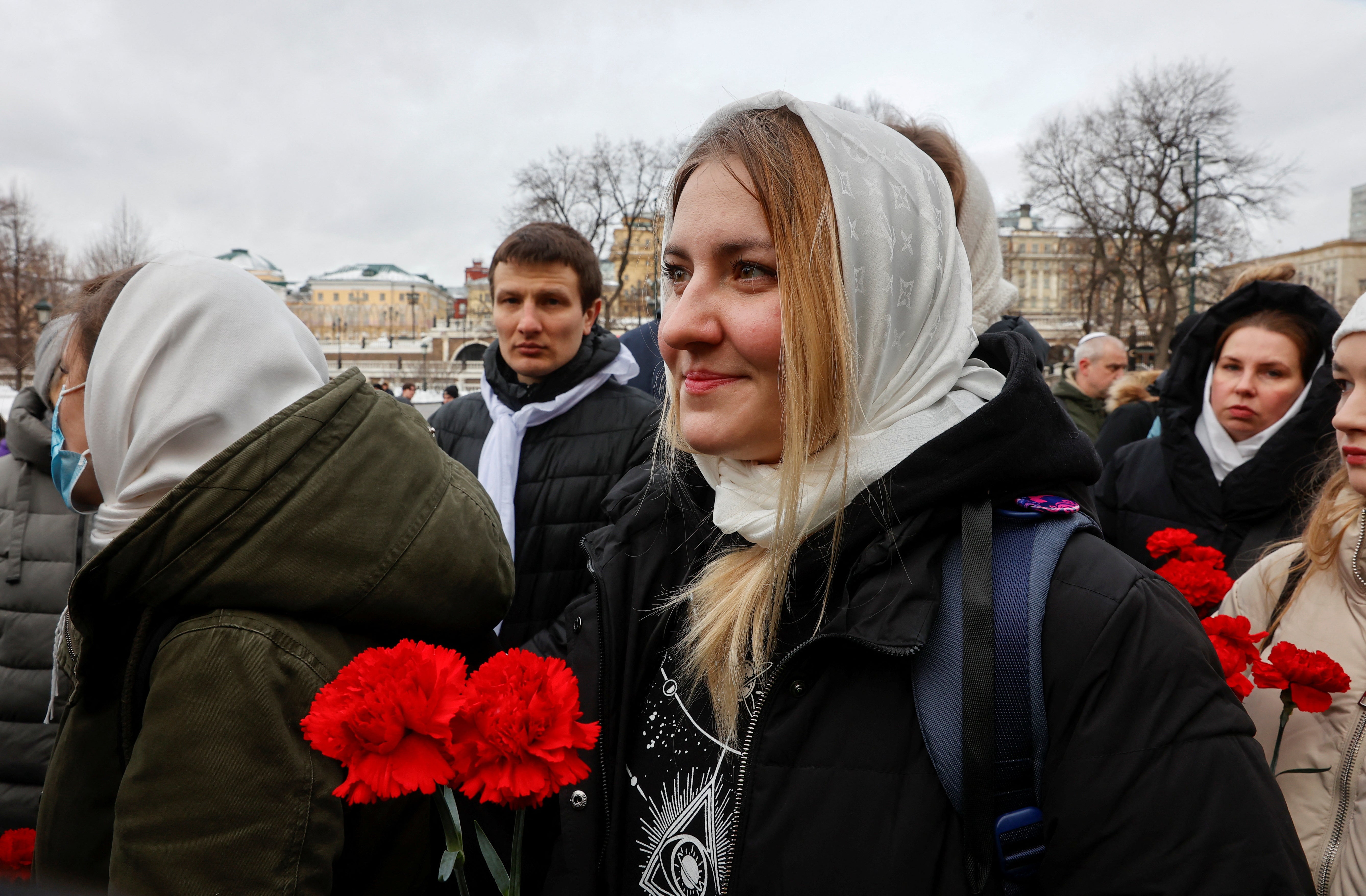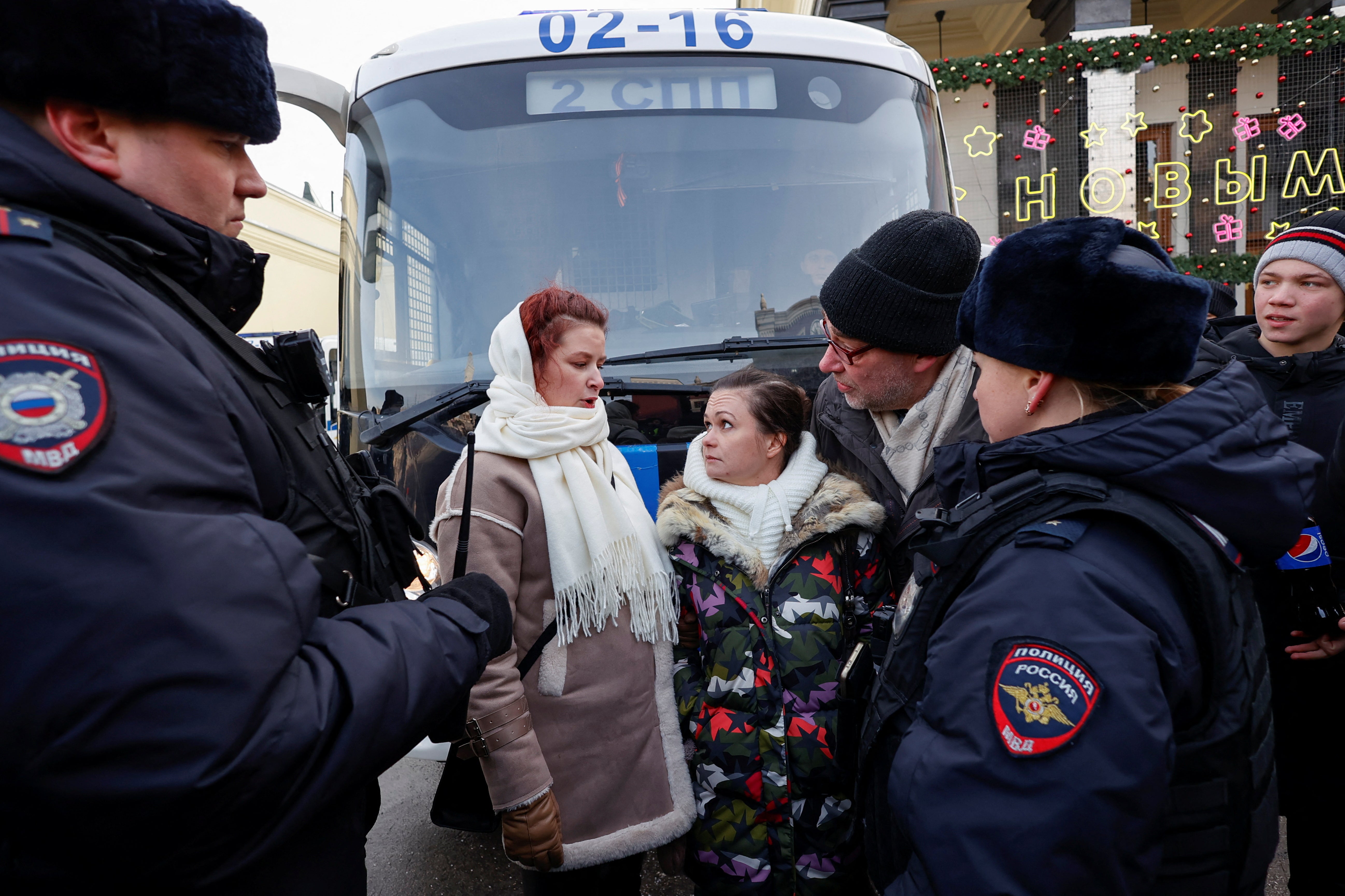Twenty journalists detained in Moscow crackdown on protests held by wives of Russian soldiers in Ukraine
Russian police crackdown on coverage as troops’ wives lay flowers at Moscow’s Tomb of the Unknown Soldier

Your support helps us to tell the story
From reproductive rights to climate change to Big Tech, The Independent is on the ground when the story is developing. Whether it's investigating the financials of Elon Musk's pro-Trump PAC or producing our latest documentary, 'The A Word', which shines a light on the American women fighting for reproductive rights, we know how important it is to parse out the facts from the messaging.
At such a critical moment in US history, we need reporters on the ground. Your donation allows us to keep sending journalists to speak to both sides of the story.
The Independent is trusted by Americans across the entire political spectrum. And unlike many other quality news outlets, we choose not to lock Americans out of our reporting and analysis with paywalls. We believe quality journalism should be available to everyone, paid for by those who can afford it.
Your support makes all the difference.Russian police have detained 20 journalists reporting on a rally in central Moscow, in which the wives of soldiers sent to the frontline in Ukraine urged Vladimir Putin to bring their loved ones home.
The relatives of military reservists have been gathering weekly to publicly voice their demands, in a rare but mounting display of dissent which threatens Mr Putin’s claim to have the full backing of the Russian people in his war against Ukraine, as he seeks a near-certain victory in next month’s presidential elections.
In the ninth and largest of the demonstrations so far, which marked 500 days since Mr Putin’s controversial mass mobilisation of reservists, the women were filmed by journalists as they lay red carnations at the Tomb of the Unknown Soldier, in the shadow of the Kremlin’s walls in central Moscow on Saturday.

But as they filmed the women walking to Moscow’s Red Square, Russian police ordered some 20 male journalists, many wearing press vests, onto a bus and took them to a police station. They were released a few hours later without charge.
OVD-Info, which reports on freedom of assembly in Russia, said around 27 people were detained in total, along with several others also protesting the mobilisation in various locations in central Moscow.
According to independent Russian news outlet SOTAvision, most were later released, although a male protester, Yaroslav Ryazanov, was still in detention on Saturday evening. Reuters and Agence France-Presse said their journalists were among those detained.
While the women’s calls have been stonewalled by Russia‘s tightly-controlled media, with some pro-Kremlin politicians seeking to cast them as Western stooges, the protests have gained the backing of several of Mr Putin’s higher-profile political opponents.
Allies of jailed Kremlin foe Alexei Navalny and Russian opposition politician Maksim Kats voiced support for the protest on Friday, while Boris Nadezhdin – the only would-be presidential challenger to Mr Putin who opposes the Ukraine war – met with the demonstrators last month.

“We want our husbands back alive,” one of the protesters, who only gave her name as Antonina for fear of reprisals, was heard saying in footage published by SOTAvision.
Antonina insisted she does not want compensation from the Russian government if her husband is killed, and said she would instead “either go to a convent or follow him”, fighting back tears as she added: “I don’t want to live alone. And if [Russian authorities] don’t understand this ... I don’t know. God be their judge.”
Saturday’s demonstration was organised campaign group The Way Home, which posted on Telegram on Friday to urge “wives, mothers, sisters and children” of reservists from across Russia to come to Moscow to “demonstrate [their] unity”.
But the Moscow prosecutor’s office warned Russians early on Saturday against participating in “unauthorised mass events”. One popular Russian Telegram news channel estimated that some 200 people took to the streets.
The mass mobilisation in autumn 2022 was widely unpopular, and prompted hundreds of thousands to flee abroad to avoid being drafted.
Aware of the public backlash, the Russian military has increasingly sought to bolster its forces in Ukraine by enlisting more volunteers. Russian authorities claim that around 500,000 signed contracts with Russia’s defence ministry last year.
In response to the crackdown on Saturday, a Reuters spokesperson said: “Journalists should be free to report the news without fear of harassment or harm, wherever they are.”
Additional reporting by agencies
Join our commenting forum
Join thought-provoking conversations, follow other Independent readers and see their replies
Comments